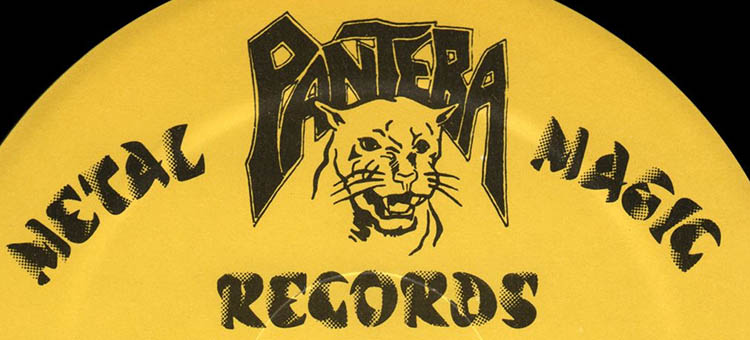 Much has already been written to chronicle Pantera's early years, their formation, history in the Metroplex, and their subsequent rise to fame, and it's not my intention to duplicate that here. Rather, this post is instead going to focus on the story of their in-house record label, Metal Magic, and on the studio where they recorded their early output: how these came to be, the story and history behind them, and the role they played in helping launch the band's career. The story begins with Jerry Bob Abbott, a country music singer/songwriter, musician, producer, sound engineer, and the father of Darrell and Vinnie Paul Abbott. The tale of Metal Magic Records is as much the story of Jerry Abbott's early career in the music production industry as it is of Pantera's early rise to fame.
Much has already been written to chronicle Pantera's early years, their formation, history in the Metroplex, and their subsequent rise to fame, and it's not my intention to duplicate that here. Rather, this post is instead going to focus on the story of their in-house record label, Metal Magic, and on the studio where they recorded their early output: how these came to be, the story and history behind them, and the role they played in helping launch the band's career. The story begins with Jerry Bob Abbott, a country music singer/songwriter, musician, producer, sound engineer, and the father of Darrell and Vinnie Paul Abbott. The tale of Metal Magic Records is as much the story of Jerry Abbott's early career in the music production industry as it is of Pantera's early rise to fame.
The senior Abbott got his start in the music business as a piano and guitar player. Having been trained on piano from childhood, and having picked up the guitar at the age of thirteen after hearing Elvis Presley on the radio, his first steady paying job as a musician was in the pianist's chair with a group known as The Chaparrals. Stepping into the role as a replacement for outgoing pianist Charlie O'Bannon, it was with The Chaparrals that Abbott gained his first real experience as part of a regular outfit, playing a heavy schedule of near-nightly performances at various honky-tonk clubs around the North Texas area. This was followed by further stints as part of various house bands, playing mostly country but on occasion also R&B and rock 'n' roll. With these groups he played mostly guitar, though he would never lose his piano roots. Ultimately, based on a referral by mutual friend and steel guitar player Gene Nivens, Abbott found himself working with Charles Stewart, a producer and songwriter with Nashville connections who wanted to learn piano. Stewart had aspirations of opening his own studio, and toward that end had commissioned the construction of one in the city of Pantego, a small enclave of about two thousand people surrounded entirely by the cities of Arlington and Dalworthington Gardens. Stewart invited his piano teacher to the construction site for a viewing, taking the time to point out where all of the various studio rooms would eventually be located. The studio opened in 1973 as Blue Royal Sound, and was rechristened some time afterward as Pantego Sound Studio.
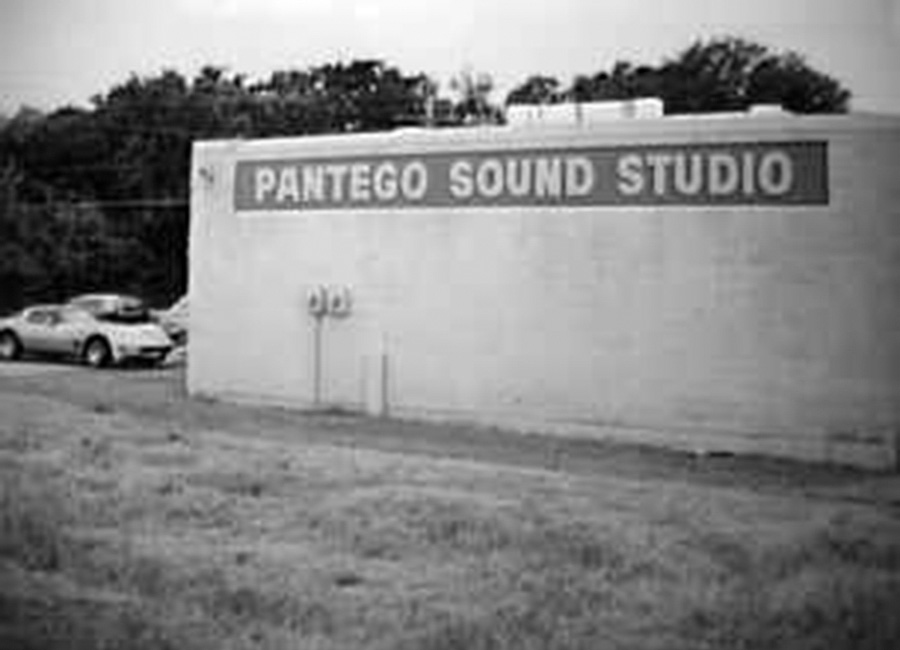
Pantego Sound's main clientele were homegrown artists, and the studio employed a regular group of session musicians on much of its output. On occasion this group of musicians included Abbott himself. Pantego's original sound engineer was none other than T-Bone Burnett, a musician and producer known and respected today for having produced well-regarded soundtrack albums for O Brother, Where Art Thou?, Walk the Line, and The Hunger Games. After six months, Burnett departed for Los Angeles to seek his fortunes there, and Abbott, who was still making his living playing in a house band, became the resident engineer and a regular songwriting collaborator of Charles Stewart. Eventually, Abbott shifted his focus more toward songwriting and recording rather than live performance, and by late 1973 he had turned in his live performance card for good in favor of a new career on the production side. Work at the studio was regular, and Pantego Sound oversaw recorded sessions for a wide variety of musical styles and genres ranging from R&B to country to rock to Tejano, producing everything from artist and song demos to full-length albums for local and regional record labels. In time, many of Abbott's own compositions as songwriter would go on to be cut by country music greats such as Joe Stampley, Don Gibson, and Buck Owens. When it came to Abbott's own career as a recording artist, however, things were storied. A few early efforts, released on a small, regional labels, failed to elicit a strong response or meet with any significant degree of success overall, with a few somewhat successful chart performances in a few individual markets ultimately petering out into near obscurity. Eventually Abbott decided to assume full control over his production and promotion. Instead of relying on the vagaries of other people's marketing efforts, He would try releasing his recordings on his own personal record label. This would prove to be a very propitious move, paving the way for what was to come.
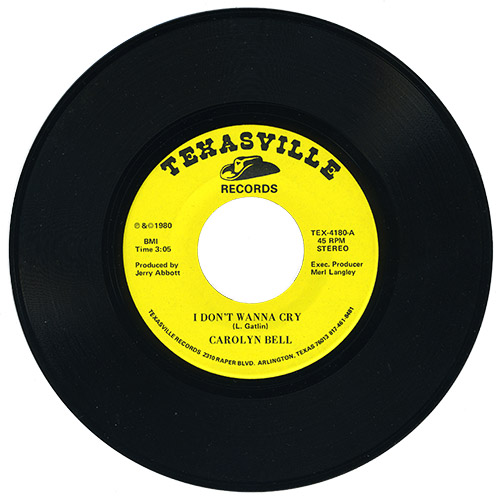
Enter Texasville Records. In 1978, two early Jerry Abbott singles, "I Want a Little Cowboy" and "I Owe It All to You," had found their way to market through of Churchill Records, an independent label headquartered in Des Plaines, Illinois. In 1979, with Abbott now more firmly at the reins, these two releases were succeeded by a third effort, "Over You," which was released on an Arlington, Texas based label going by the name of Texasville Records. The Texasville Records mailing address was 2310 Raper Blvd. in Pantego, Texas, an address that corresponded to the lot directly adjoining the Pantego Sound Studio. Over the next few years, in addition to Abbott's own solo recordings, 45 RPM discs were issued featuring the likes of Lynn Echols, Dale Snow, Jerry Upchurch, and Carolyn Bell, among others. The Texasville Records story seems to end around 1982, with Discogs.com listing a total of nine releases as of this writing (there were likely more, but information on them is scant and difficult to come by). In any case, by 1983, a new focus for Abbott's production and marketing expertise had begun to take a center stage, one which would demand the establishment of a new record label and which would lead ultimately to great fame and notoriety for an act very close to his heart. That label would be Metal Magic Records, and that act - of course - was Pantera.
The band that became Pantera got its start around 1981 when local teenagers Donnie Hart and Tommy Bradford connected with fifteen year old guitarist Terrence Glaze. The trio would later bring in drummer Vincent Abbott via the high school jazz band, who in turn brought his brother Darrell into the fold. By 1982, the lineup had solidified into a four piece act featuring the Abbott boys Vincent and Darrell on drums and guitar, respectively, Rex Brown on bass, and (now front man) Terry Glaze on vocals and guitar. The old man Abbott, affectionately christened "LD" by Darrell, acted as the band's live sound engineer, producer, promoter, booking agent, financial backer, and roadie, driving them to and from their various gigs and helping with the handling of the equipment. The Abbott brothers had grown up surrounded by musical influence, and given that the elder Abbott was chief engineer in a successful local recording studio, the brothers and band as a whole were able to get valuable experience in the studio during the off hours between already booked acts. Eventually, they would begin recording sessions themselves, with the elder Abbott at the console. Pantera's ultimate goal was to sign with a domestic major label, but until that could happen, they needed an outlet for their original material while they continued to grow and mature as a band. "LD" suggested the name "Metal Magic" because, as he put it in his autobiography, "that's literally what I thought the band was... Metal Magic'." The first release through the new label, the eponymously titled Metal Magic LP, was produced by Jerry Abbott and Pantera and was released in June of 1983. This time around, the mailing address was the more familiar 2210 Raper Blvd., the same as Pantego Sound Studio.
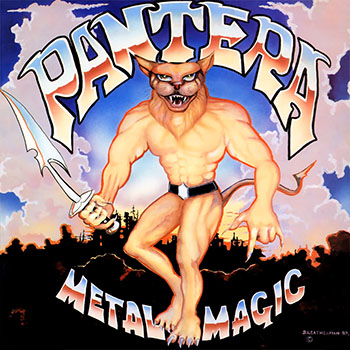
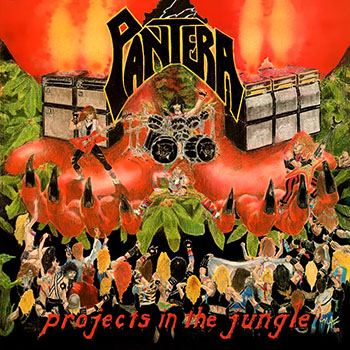
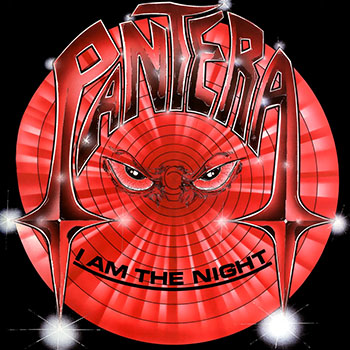
By 1984, Darrell's playing had matured to the point that Glaze would focus solely on vocals, at least in the studio. That year saw the release of Pantera's second album, Projects in the Jungle, and the recording of the band's first music video for "All Over Tonight" at a club in Denison, Texas. Pantera continued to grind the area clubs and private parties, all the while continuing to hone their songwriting and performance skills and produce their records. While the albums sold modestly well at gigs, the band itself was on fire, with their local performances often drawing large crowds and helping them build up a notoriety and reputation that made them local favorites all across their regional circuit. Despite this, a major label deal was fleeting. Although - according to Jerry Abbott - there were some indications of interest from smaller and foreign labels, the band and Abbott insisted on holding out until a suitable domestic major label deal could be secured.
Following the release of 1985's I Am the Night, Terry Glaze would express his dissatisfaction with the current state of life in Pantera by opting to part company with his bandmates and, by extension, the Metal Magic label. As he would later explain in numerous interviews, Glaze's main impetus for leaving was the imbalance of voting power within the band, with the Abbott family members voting as a bloc and effectively dictating the entire direction of the band regardless of any contributions he and bassist Rex Brown might try to make. A succession of temporary and fill-in vocalists held his position until Louisiana native Phillip Anselmo stepped into the role in 1987. Power Metal, Pantera's fourth album, showcased a strong shift away from a glam/hair metal style toward a new sound the band would come to call "groove metal." This 1988 effort was also the first Pantera album to be (legitimately, at least) released on compact disc. Listened to today, Power Metal is clearly a transitional album, made with one foot rooted in the band's heretofore glam-centric sensibilities and the other in the rapidly burgeoning heavier and more aggressive style with which they would reach their greatest success. It also proved to be the final release on Metal Magic Records, as in 1989 the band finally scored a major label record deal courtesy of Mark Ross and Derek Shulman of Atco Records. It was at this point that Jerry Abbott made his exit as Pantera's producer and engineer, also doffing the many other hats he wore for the band. He would eventually depart for Nashville in late 1991 following the band's recording of Vulgar Display of Power, their second major label effort. There he would leverage the contacts he had made during his time in the music business and parlay them into a fairly successful career as a songwriter and producer.
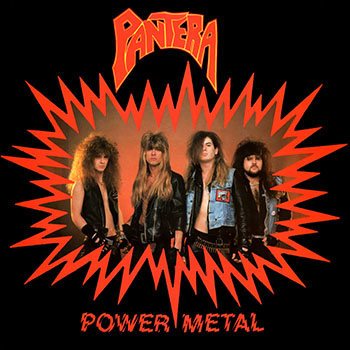
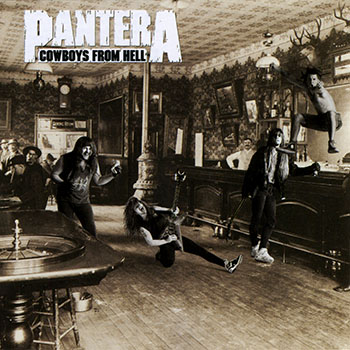
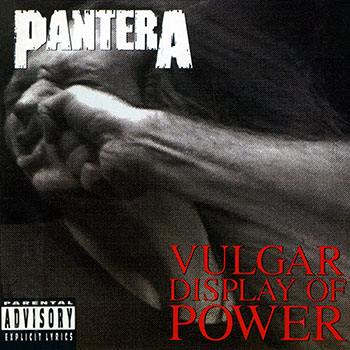
But while this is the end of the story for Metal Magic Records, it is not quite the end for Pantego Sound Studio. Pantera and their producer via Atco, Terry Date, continued to record there for a few more years until 1994's Far Beyond Driven became the band's first album to be recorded at a different studio (in this case, Abtrax Recording in Nashville). Pantego Sound carried on, now helmed by Jerry Hudson, a recording engineer who had once worked under Jerry Abbott before making a career change in the mid 1980s. Hudson returned and took over from Abbott, who had himself taken over ownership from Charles Stewart in the late '80s. The studio continued to offer recording sessions and production services for artists up until its ultimate closure in 1996. Today, the old building stands largely unmaintained and forlorn, unassumingly tucked away at the dead end of a sleepy boulevard in an old commercial district of Pantego. What remains of the one-time recording studio evinces none of its former glory or significance in the story of one of the world's biggest metal bands. When I visited 2210 Raper Blvd. with my friend in April 2023, the "2210" splayed across the front door (since painted over) were all that remained to bear witness to one of the most important recording institutions in the local music scene. It stands now as a true ghost of DFW music history.


This is awesome! Can’t wait until the next installment 💯💯👏🏼👏🏼‼️